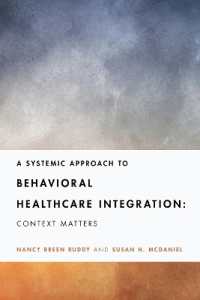- ホーム
- > 洋書
- > 英文書
- > History / American
Full Description
Between the American Civil War and the outbreak of world War I, global history was transformed by two events: the United States's rise to the status of a great world power (indeed, the world's greatest economic power) and the eruption of nineteenth- and twentieth-century revolutions in Mexico, China, Russia, Cuba, the Philippines, Hawaii, Panama, Nicaragua, and elsewhere. The American Search for Opportunity traces the U.S. foreign policy between 1865 and 1913, linking these two historic trends by noting how the United States - usually thought of as antirevolutionary and embarked on a 'search for order' during this era - actually was a determinative force in helping to trigger these revolutions. Walter LaFeber argues that industrialization fuelled centralisation: Post-Civil War America remained a vast, unwieldy country of isolated, parochial communities, but the federal government and a new corporate capitalism now had the power to invade these areas and integrate them into an industrialization, railway-linked nation-state. The furious pace of economic growth in America attracted refugees from all parts of the world. Professor LaFeber describes and influx of immigration so enormous that it led to America's first exclusionary immigration act. In 1882, the United States passed legislation preventing all Chinese immigrant labour, skilled and unskilled, from entering the country for the next 10 years.
Contents
General editor's introduction; Preface; 1. Springboards and strategies; 2. The Second Industrial Revolution at home and abroad; 3. Race for empire; 4. 'America will take this continent in hand alone'; 5. Crossing the oceans; 6. 1893-1896: Chaos and crises; 7. The empire of 1898 - and upheaval; 8. Pacific empire - and upheaval; 9. Theodore Roosevelt: conservative as revolutionary; 10. William Howard taft and the age of revolution; Conclusion: the 1865-1913 era restated; Bibliographic essay; Index; Maps.








